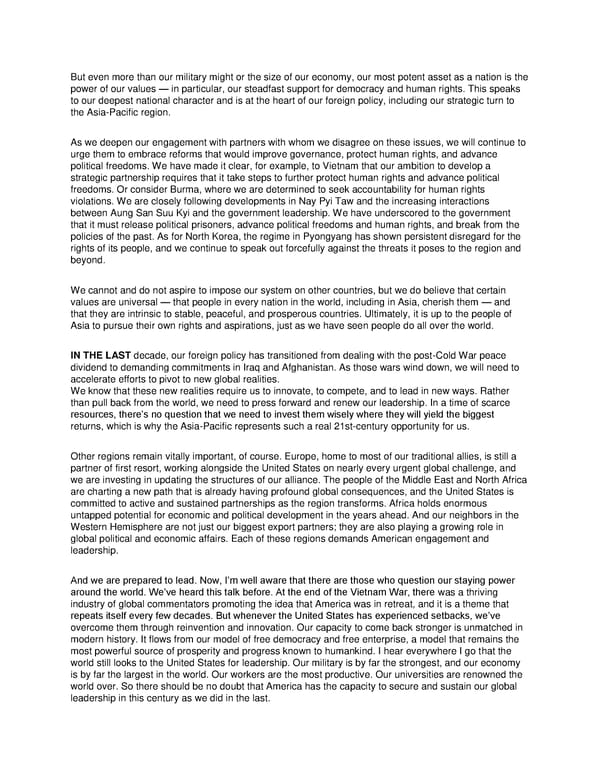But even more than our military might or the size of our economy, our most potent asset as a nation is the power of our values — in particular, our steadfast support for democracy and human rights. This speaks to our deepest national character and is at the heart of our foreign policy, including our strategic turn to the Asia-Pacific region. As we deepen our engagement with partners with whom we disagree on these issues, we will continue to urge them to embrace reforms that would improve governance, protect human rights, and advance political freedoms. We have made it clear, for example, to Vietnam that our ambition to develop a strategic partnership requires that it take steps to further protect human rights and advance political freedoms. Or consider Burma, where we are determined to seek accountability for human rights violations. We are closely following developments in Nay Pyi Taw and the increasing interactions between Aung San Suu Kyi and the government leadership. We have underscored to the government that it must release political prisoners, advance political freedoms and human rights, and break from the policies of the past. As for North Korea, the regime in Pyongyang has shown persistent disregard for the rights of its people, and we continue to speak out forcefully against the threats it poses to the region and beyond. We cannot and do not aspire to impose our system on other countries, but we do believe that certain values are universal — that people in every nation in the world, including in Asia, cherish them — and that they are intrinsic to stable, peaceful, and prosperous countries. Ultimately, it is up to the people of Asia to pursue their own rights and aspirations, just as we have seen people do all over the world. IN THE LAST decade, our foreign policy has transitioned from dealing with the post-Cold War peace dividend to demanding commitments in Iraq and Afghanistan. As those wars wind down, we will need to accelerate efforts to pivot to new global realities. We know that these new realities require us to innovate, to compete, and to lead in new ways. Rather than pull back from the world, we need to press forward and renew our leadership. In a time of scarce resources, there’s no question that we need to invest them wisely where they will yield the biggest returns, which is why the Asia-Pacific represents such a real 21st-century opportunity for us. Other regions remain vitally important, of course. Europe, home to most of our traditional allies, is still a partner of first resort, working alongside the United States on nearly every urgent global challenge, and we are investing in updating the structures of our alliance. The people of the Middle East and North Africa are charting a new path that is already having profound global consequences, and the United States is committed to active and sustained partnerships as the region transforms. Africa holds enormous untapped potential for economic and political development in the years ahead. And our neighbors in the Western Hemisphere are not just our biggest export partners; they are also playing a growing role in global political and economic affairs. Each of these regions demands American engagement and leadership. And we are prepared to lead. Now, I’m well aware that there are those who question our staying power around the world. We’ve heard this talk before. At the end of the Vietnam War, there was a thriving industry of global commentators promoting the idea that America was in retreat, and it is a theme that repeats itself every few decades. But whenever the United States has experienced setbacks, we’ve overcome them through reinvention and innovation. Our capacity to come back stronger is unmatched in modern history. It flows from our model of free democracy and free enterprise, a model that remains the most powerful source of prosperity and progress known to humankind. I hear everywhere I go that the world still looks to the United States for leadership. Our military is by far the strongest, and our economy is by far the largest in the world. Our workers are the most productive. Our universities are renowned the world over. So there should be no doubt that America has the capacity to secure and sustain our global leadership in this century as we did in the last.
 HRC America's Pacific Century Page 7 Page 9
HRC America's Pacific Century Page 7 Page 9